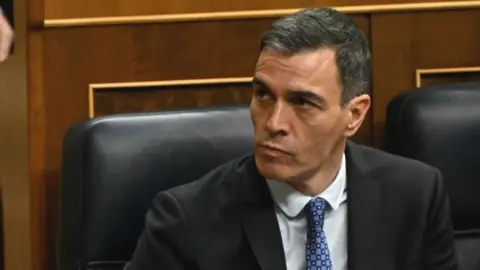Spain congress votes against Catalan separatists amnesty bill
 Getty Images
Getty ImagesThe Spanish congress has blocked a controversial amnesty law that aimed to benefit Catalan nationalists involved in separatist activities, in a shock move.
The Together for Catalonia (JxCat) party voted against it over fears it does not provide enough protection for those politicians who are being investigated for terror-related crimes.
They included the ex-president of the Catalonia region, who was involved in a failed bid for independence in 2017.
The legislation has divided Spain.
The bill, presented by Socialist Pedro Sánchez's government, faced its first major parliamentary test on Tuesday.
With an array of nationalist parties, including JxCat - led by former Catalan president Carles Puigdemont - in favour of an amnesty, the law appeared set to be approved by congress.
However, instead it was blocked as JxCat voted against it, citing what it said was judicial interference aimed at sabotaging the law.
"We cannot participate in allowing the Catalan independence movement to be exposed to the whims of the politicised Spanish judiciary," said Miriam Nogueras, spokeswoman for JxCat.
The conservative People's Party (PP) and the far-right Vox, which have both been fierce critics of the amnesty, also voted against it, meaning the bill received 171 votes - five short of the majority it needed.
It will now be returned to a parliamentary commission which must resubmit the bill within a month, after revision. The law would also need to be approved by the senate before being implemented.
Last week, a national court judge, Manuel García-Castellón, issued a report suggesting Mr Puigdemont and some others could be accused of terrorist offences because of alleged involvement with Democratic Tsunami, a pro-independence activist group which staged mass protests in 2019, including one which brought Barcelona's El Prat airport to a halt.
The terrorism claim meant that the former Catalan president risked being excluded from the amnesty.
Mr Sánchez's Socialists immediately negotiated with JxCat and their fellow nationalists of the Catalan Republican Left (ERC) amendments to the bill aimed at ensuring Mr Puigdemont remained within the amnesty's ambit.
The modification stated that those involved in terrorist crimes that did not knowingly violate human rights were still eligible to benefit from the amnesty.
Nonetheless, a second report issued by Mr García-Castellón specified that Democratic Tsunami may indeed have breached human rights.
In a separate development another judge, Joaquín Aguirre, raised the possibility of Mr Puigdemont being investigated for high treason for alleged contacts with Russian officials ahead of the 2017 secession attempt. That crime would also exclude him from the amnesty.
Despite JxCat demands that further amendments be added to the legislation to adapt to these developments, the Socialists insisted on leaving it untouched.
ERC reprimanded JxCat for voting against the law.
"This law has enough strength to not be changed by the prevaricating judges who want it to hit the rocks," said Pilar Vallugera, of ERC.
The right-wing opposition has claimed the amnesty is unconstitutional and that Mr Sánchez is trying to push it through because he needs the parliamentary backing of ERC and JxCat.
"Sánchez has decided to be a hostage [to Catalan nationalism], but we Spaniards are not going to pay the ransom," said PP leader Alberto Núñez Feijóo.
